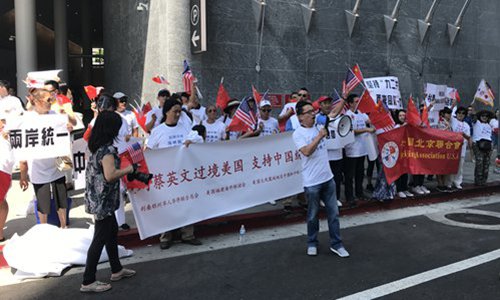
Chinese demonstrators sing songs and chant slogans while waiting for the arrival of Taiwan leader Tsai Ing-wen in Los Angeles in August 2018. As Tsai arrived at the Intercontinental Hotel, she was greeted by peaceful Chinese demonstrators of all ages and from all walks of life. They were holding flags, banners and signs bearing the slogan One China. The crowd began chanting One China! and Oppose Taiwan Independence! as Tsai pulled into the hotel. Photo: Wang Rujun
Editor's Note:
Taiwan leader Tsai Ing-wen gave her inaugural speech to start her second term on Wednesday.
In the part that concerns cross-Straits relations, she reiterated the words about peace, parity, democracy, and dialogue which she had mentioned in her election victory address on January 11. She also said Taiwan will not accept the Beijing authorities' use of 'one country, two systems' to downgrade Taiwan and undermine the cross-strait status quo.
How to interpret Tsai's intentions regarding cross-Straits ties? How will cross-Straits relations evolve under Tsai's second term? The Global Times invited the opinion of two experts.
Li Fei, a professor with the Taiwan Research Institute at Xiamen University
Judging from Tsai's statement on cross-Straits relations in her inaugural speech, it's clear that she still dare not cross the bottom line of cross-Straits relations. On one hand, she evaded the 1992 consensus in her speech. This is in line with her previous stances. She also said Taiwan will continue to handle cross-Straits affairs according to the relevant laws of Taiwan area and the Act Governing Relations between the People of the Taiwan Area and the Mainland Area. Some forces in Taiwan were pushing to amend the Act Governing Relations between the People of the Taiwan Area and the Mainland Area, which indicates the cross-Straits relationship is one between two regions rather than two states. Tsai's statement shows that Taiwan dare not break the legal framework to seek independence.
Because of Tsai's refusal to acknowledge the 1992 consensus, the political basis of cross-Straits relations, the ties between the island of Taiwan and the mainland have reached a freezing point, dealing a heavy blow to economic and trade relations.
After all, the economy of Taiwan is highly dependent on the mainland. Tsai is pushing her New Southbound Policy, but it remains to be seen how effective this policy will be.
In the future, Taiwan will continue to follow a pro-US policy. It attempts to seek secession by riding the US' coattails and relying on US support. Such a delusional plan coincides with the US strategy to contain China, so Tsai's authorities feel encouraged.
Both the island of Taiwan and Washington are constantly touching Beijing's bottom-line, but neither of them dares to cross it. The Tsai authorities have become more emboldened to challenge the mainland because of the US support.
Washington is simply using Taiwan as a pawn to create troubles for the mainland. The chance that a war breaks out between the island of Taiwan and the mainland is much bigger than that between Beijing and Washington. If Taiwan crossed the mainland's bottom-line, the mainland will take military actions. How will the US react then? The US will be very cautious about whether it should militarily intervene in. The cost for a military intervention is too high for the US to afford - as can be seen from US' dealings with Iran.
原文链接:http://enapp.globaltimes.cn/#/article/1188907
(责任编辑:万晓燕)

